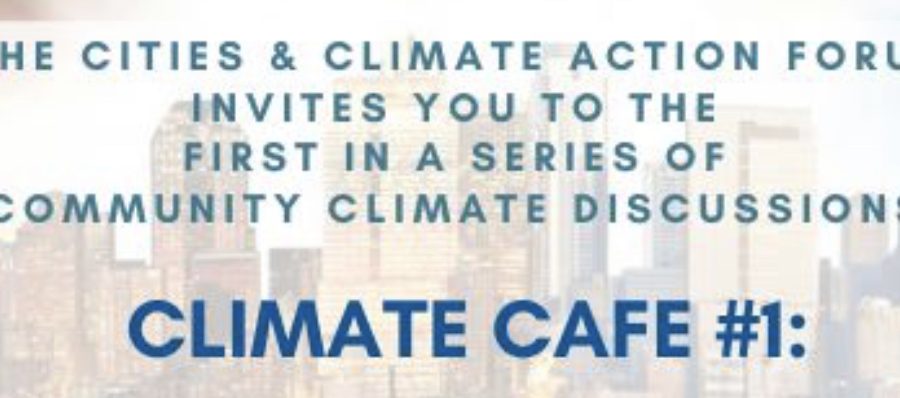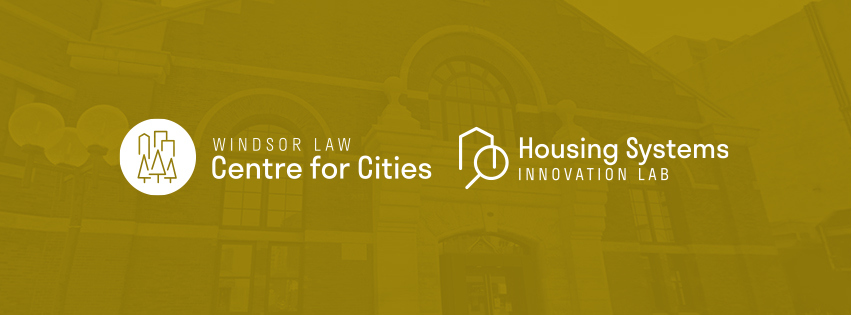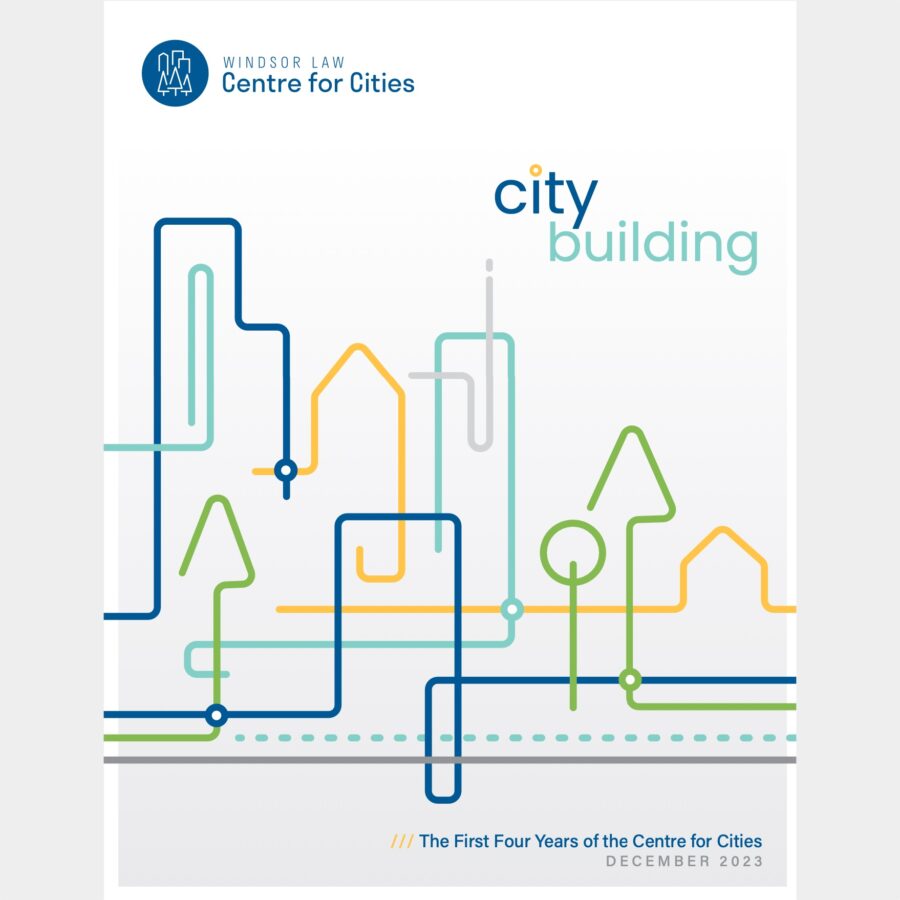
Blog: Climate Café #1 was a conversation on climate science and the Windsor 2020 budget
(27 January 2020) By Tasha Stansbury (Windsor Law 3L student, Cities and Climate Action Forum member)
Windsor community members gathered on January 23 for the Cities and Climate Action Forum’s first Climate Café. The Café provided a space for Windsorites to discuss the science of climate change and the ways in which the proposed City of Windsor 2020 budget addresses the need to slow the effects of climate change.
Windsor Law JD Candidate and Cities and Climate Action Forum student Sarah Gulas kicked off the evening with her presentation on the basics of climate science. Ms. Gulas has a Bachelor of Science and Master of Resource and Environment Management.
Gulas’ presentation boiled climate change down to the basics, explaining the difference between weather and climate, exploring the causes of climate change, the role of human activity, and different response methods. She outlined three main pillars of response to climate change: Adaptation (living with climate change); mitigation (slowing down climate change); and resilience, considering adaptation and mitigation together in order to best strengthen our current system to reduce and recover from climate events.
Gulas highlighted the roles of cities in responding to climate change; around 50% of the world’s population lives in urban areas, and cities are responsible for 67% of energy-related greenhouse gas emissions. In light of Canada’s international commitments to reducing emissions, it is vital that cities play their part in combating climate change.
In the second discussion, Frazier Fathers, Director of Continuous Improvement and Advocacy for the United Way Windsor Essex, took a closer look at how the City of Windsor is tackling climate change in the 2020 budget, which is scheduled to be discussed on Monday 27 January.. The plan covers the next 8 years of municipal spending.
(Frazier Fathers)
Windsor City Council unanimously passed a climate emergency declaration on November 18. The declaration included a commitment to preparing a report within 90 days containing “recommendations for priority action items, implementation measures, [and] cost requirements to accelerate and urgently work towards the reduction of emissions and preparing for our climate future.”
As those reports are not due until February, the proposed budget does not reflect the report’s recommendations. However, as one attendee stressed, given the climate emergency it is important to construct the city budget through the lens of climate change rather than simply holding out for the report. Other language in the climate emergency declaration is enough to require that a climate lens be used on budget decisions already in 2020. To quote from the declaration, what is required are “robust and permanent changes in how the City and County conduct their business” in response to the climate crisis.
The declaration goes on to say that responding to the climate emergency and reducing emissions “are deemed to be high priorities when considering budget direction and in all decisions of council.” Reading this alongside Council’s commitment in the 2017 Community Energy Plan to a target of a reduction in greenhouse gas emissions of 40% by 2041 (itself a very modest target) it is clear that the 2020 budget process should already be prioritizing budget items which help to mitigate climate change.
Fathers raised some examples of climate-related items in the 2020 budget. One is the new Transit Plan to expand the city bus system, putting 60 new buses on the roads. The City has dedicated $50,000 to this project starting in 2022, and the federal government has promised funding for more hybrid engine buses. Increased Sunday bus service is also included in the budget.
Fathers noted that although the new transit plan should make a significant impact on local emissions by encouraging people to take public transit, there is an associated risk; if the federal grants don’t come in, or if the city is unable to procure enough hybrid buses, older, less energy efficient buses will have to be used to drive the transit plan forward. Other climate-related initiatives included in the budget were hiring an active transit coordinator and making improvements to park flood mitigation, as 50% of the parks in the city don’t have adequate drainage systems.
(Frazier Fathers)
Fathers explained that some elements of the budget are “locked in” from previous years’ commitments and therefore do not appear in the budget. For example, road repairs are scheduled years in advance, and the material used is predetermined. Huron Church Road was recently repaved with concrete, which lasts longer but is more expensive than asphalt; on the other hand, less busy roads are more likely to be repaved with asphalt to save money. Fathers also noted that some budget items lack the detail to be able to discern all of what is included – for example bike lanes in new road projects – making it difficult to do a full analysis of the climate impact of the budget.
Other projects are left unfunded due to City staffing shortages, making it difficult to implement new ideas and take risks to try new projects. Windsor has budgeted for the addition of some such staff, including a Community Energy Plan Project Administrator and an Active Transportation Coordinator.
Fathers indicated that there are other cities for Windsor to look to for examples of alternative budgeting strategies. The city of Guelph, for example, has implemented an interactive tool that allows community members to indicate what kind of initiatives they would be willing to pay additional taxes for. A keyword system can also be used to make it easier to search out a particular theme, such as “climate change”, throughout the budget. Valérie Plante, the mayor of Montreal, said earlier this month that all municipal decisions needed to be made through the lens of climate change.
“There are lots of good ideas in [the budget],” Fathers said. “They’re just not all funded.” Dr. Anneke Smit, director of the Windsor Law Centre for Cities, pointed out that constituents continuing to tell their councillors that climate mitigation is important to them will help them to see there is public support for substantial climate action.
Refreshments were available after the presentations for more informal discussion. A whiteboard was set up in the foyer for attendees to share additional feedback on the budget:
Community members are strongly encouraged to get involved by attending City Council meetings and contacting their councillors. City Council must know where the community’s priorities lie if they are to make strong choices to fight climate change going forward.
To access the City of Windsor’s Climate Emergency Declaration, go to www.tinyurl.com/WindsorCity18Nov2019 and go to page 34 of the PDF document.
To access the CCAF’s Primer on Working with Municipal Governments, go to https://windsorlawcities.ca/working-on-climate-action-with-municipal-governments/.
Stay tuned on https://windsorlawcities.ca/projects/cities-climate-action and follow us on Facebook, Instagram, and Twitter @CityClimateAct for information on upcoming Climate Cafés!



